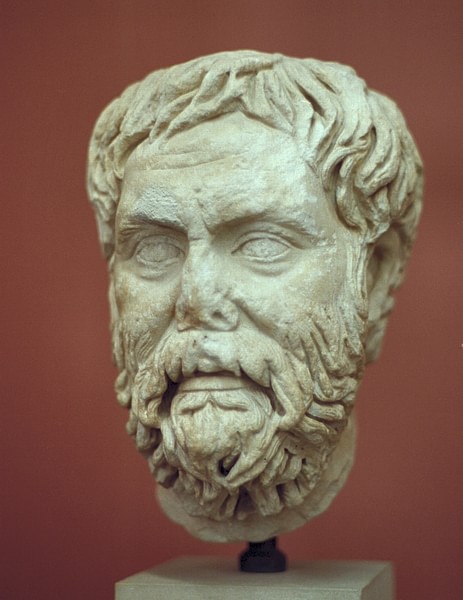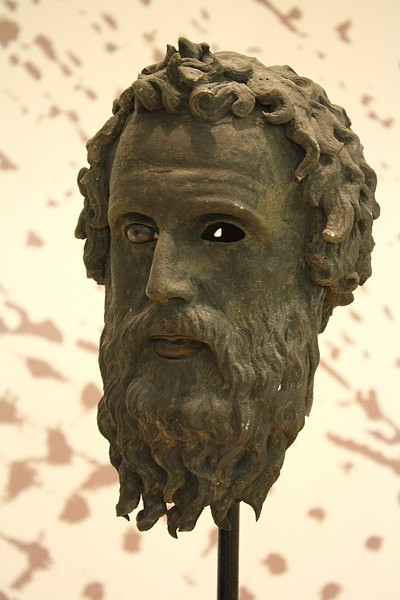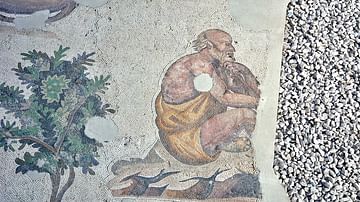
Pyrrho of Elis (l. c. 360 to c. 270 BCE) was a Greek skeptic philosopher credited with founding the school of Pyrrhonism which taught that one must resist making judgments or stating conclusions because sense perception did not correlate to reality. By remaining skeptical of any dogma, he said, one would lead a peaceful life.
Pyrrho wrote nothing himself, and his belief system was preserved by his student Timon of Phlius (l. c. 320 to c. 235 BCE) and later by the skeptic philosopher and compiler Sextus Empiricus (l. c. 160 to c. 210 CE). According to the often-unreliable historian Diogenes Laertius (l. c. 180-240 CE), Pyrrho traveled on campaign with Alexander the Great (l. 356-323 BCE) in the company of Alexander's friend Anaxarchus (l. c. 380 to c. 320 BCE), also a philosopher, most likely Pyrrho's teacher, and an adherent of the views of Democritus (l. c. 460 to c. 370 BCE) who rejected the concept of a 'meaning' to life and advocated simply living it well.
Most of what is known of Pyrrho's life comes from Diogenes Laertius, though brief anecdotes exist in other works. He is said to have studied with Indian wisemen while on campaign with Alexander and to have blended Greek and Indian philosophies to form his own. This claim has been challenged, although it is acknowledged there may be some truth to it. He was a popular figure in his hometown of Elis where he was ordained high priest and a statue was erected in his honor. He is remembered as the founder of the first skeptical school of philosophy in Greece, which inspired the system of academic skepticism that informed later skeptical philosophies.
Life & Philosophic Influences
Almost nothing is known of Pyrrho's life, and much of what is has been challenged based on the nature of the ancient source (whether it is actually satire or if the writer is reliable), contradictory interpretations of his life and philosophy, and scarcity of sources overall. According to Laertius, he was born at Elis, the son of one Pleistarchus, and was originally a painter before he became interested in philosophy after hearing Democritus' views on the nature of existence.
He was most likely introduced to Democritus' philosophy by Anaxarchus, who is associated with Democritus' school of thought. Democritus, and his teacher Leucippus (l. 5th century BCE), were the first to suggest the model of an atomic universe in which everything is composed of atomos ("uncuttables," atoms) which, when attached to each other in different ways, produced varying forms, whether a human, a dog, a rock, or grass. Democritus developed his theory in response to the Eleatic school of Parmenides (l. c. 485 BCE), Zeno of Elea (l. c. 465 BCE), and Melissus of Samos (l. c. 5th century BCE), which maintained that all of existence is made up of a single, uncreated, indestructible substance.
Leucippus and Democritus suggested that this substance was not one but many tiny units, which came together and broke apart, as suggested by the philosophical models of Empedocles (l. c. 484-424 BCE) and, especially, Anaxagoras (l. c. 500 to c. 428 BCE). Anaxagoras had suggested that everything was comprised of 'seeds,' which made each thing what it was, and this 'substance' was defined by Democritus as an atom. The claims of Leucippus and Democritus resulted in the name given to their school of thought, atomists.
Democritus maintained that atoms behaved in a certain way based on their nature, not on the will of the gods or one's actions, and so peoples' beliefs on why things happened as they did, or even what observable phenomena were or what experience seemed to indicate, was suspect. If one thought that a person died because they were being punished by the gods, one was wrong, Democritus would say, as it was actually only because of the breakdown of the form composed of atoms, which would then go on to take some other form naturally, not for any set reason or meaning. Scholar Robin Waterfield comments:
Given their views, the atomists were led to a deep suspicion of the evidence of the senses, and even to a kind of skepticism…Democritus' reasons for this skepticism went further than just the contrast between the evidence of the senses and what reason tells us about the realities of the world. He also pointed to the relativity of sense-impressions to justify his doubts about the senses; however, whereas [the sophist] Protagoras adopted the relativist position that, in cases of clashing perceptions, all perceptions are true, Democritus concluded that none of them were true. And from this it follows that to attribute any quality to anything is no more than a convenience and a convention. (167)
At the same time, Democritus suggested that experience can shape one's reality in that the repeated experience of perceiving salt as salt gives one solid grounds on which to conclude that what is known as salt tastes salty and differs from that which tastes sweet, like honey. These seem to have been the views expressed by Anaxarchus which first attracted Pyrrho to philosophical inquiry and were repeated by him. Anaxarchus came from Abdera (as did Democritus and Protagoras) and most likely was a student at the school founded by Democritus. It is unknown how Pyrrho and Anaxarchus met, but they are said to have left Greece together in 334 BCE with Alexander's army in the conquest of Persia.
Alexander & Indian Influences
After conquering the Persian Achaemenid Empire, Alexander reached India in 327 BCE, and here, according to Laertius, Pyrrho conferred with the "Indian Gymnosophists and with the Magi," which led him to "adopt a most noble philosophy…taking the form of agnosticism and suspension of judgment" (11.61). Who these men were continues to be debated as "gymnosophists" means "naked wisemen" and could refer to ascetics of Jainism, Buddhism, or Hinduism, as could the term "magi." Some scholars have tried to identify these wisemen as Buddhists, claiming that Pyrrho's later philosophy suggests Buddhist influence, but it is equally possible and more likely that the sages he encountered were adherents of Charvaka.
Charvaka was a philosophical school of thought founded c. 600 BCE that stressed materialism and claimed the pursuit of pleasure was the meaning of life. It also encouraged skepticism regarding any claims about reality because such claims were based on subjective interpretation of objective phenomena, and this aspect resonates with Pyrrho's later philosophy. One might claim that someone else was poor based on their clothing, but this was simply an interpretation of what constituted being 'poor' according to the observer and that claim might have nothing to do with the actual financial situation of the 'poor' person. Pyrrho seems to have proven this point upon his return to Elis, where he lived as a poor man in relative isolation, even though he seems to have come from a family of means and had a sister living comfortably nearby.
The skepticism of Charvaka or other Indian schools of thought may not have influenced Pyrrho as significantly as Laertius claims, however, as he was already acquainted with similar views expressed by Democritus and Anaxarchus. It is possible, however, that learning of similar conclusions, held by people of a different nationality half a world away from Greece, convinced him of their truth and led him to develop the system that came to be known as Pyrrhonism.
Pyrrhonism
The summation of Pyrrho's philosophy is the so-called Aristocles Passage, which is a brief paragraph attributed to Aristocles of Messene (l. c. 1st century CE) who was quoting Pyrrho's student Timon of Phlius and who is quoted by the Christian historian Eusebius of Caesarea (l. c. 260-339 CE). The passage presents three questions one must answer on the nature of reality and suggests the proper response to them based on Pyrrhonist thought:
- What is the nature of any subject matter, including ethics?
- How should one respond to any subject matter, including ethics?
- What will be the outcome of one's response to any subject matter?
Pyrrho, according to the passage, answers that (1.) all observable phenomena are undifferentiated, unstable, and unfixed by their nature, (2.) one's sense perceptions cannot tell one the truth about observable phenomena nor can they lie because observable phenomena are beyond the ability of the senses to truly comprehend, (3.) one should, therefore, refrain from judgments or any conclusions regarding what is perceived, refusing to accept any claims on the basis that they are neither truth nor a lie but simply a person's observation based on experience and belief. By remaining uncommitted to any conclusion, one would free the mind to achieve a state of ataraxia, freedom from psychological agitation and distress.
This is a simplified interpretation of the Aristocles Passage, whose meaning is still debated as the original Greek words could be interpreted to mean either that reality itself is unknowable or that humans lack the ability to know what can be known. Either way, the one aspect of the passage that is clear is the claim regarding the third question that the outcome of a non-judgmental response to sense perceptions results in peace of mind. This claim is generally considered to be original to Pyrrho.
By rejecting any dogma, Pyrrho seems to have claimed, one liberated oneself from the false belief that one actually could understand reality and, further, would no longer be drawn into pointless discussions and arguments over what is or is not true. When presented with a statement such as "this is a good book," one should consider reasons to accept and reject that statement equally and conclude nothing whatsoever except that Person X made such a statement. It could not be denied that Person X had made the statement, but whether that statement was true or what the quality of the book might be were unknowns. A book might be considered 'good' by Person X but not by Person Y, and so agreeing or disagreeing with the statement was pointless because it was neither true nor false but only the opinion of Person X.
The essence of Pyrrho's skepticism, or at least what came to be understood as his philosophy, is fully defined by Sextus Empiricus in his Outlines of Pyrrhonism, I.IV.8-10:
Skepticism is an ability, or mental attitude, which opposes appearances to judgments in any way whatsoever, with the result that, owing to the equipollence of the objects and reasons thus opposed, we are brought firstly to a state of mental suspense and next to a state of "unperturbedness" or quietude. Now, we call it an "ability" not in any subtle sense, but simply in respect of its "being able." By "appearances" we now mean the objects of sense perception, whence we contrast them with the objects of thought or "judgments." The phrase "in any way whatsoever" can be connected either with the word "ability," to make us take the word "ability" as we said, in its simple sense, or with the phrase "opposing appearances to judgments"; for inasmuch as we oppose these in a variety of ways – appearances to appearances, or judgments to judgments - in order to ensure the inclusion of all these antitheses, we employ the phrase "in any way whatsoever." Or, again, we join, "in any way whatsoever" to "appearances and judgments" in order that we may not have to inquire how the appearances appear or how the thought objects are judged but may take these terms in the simple sense. The phrase "opposed judgments" we do not employ in the sense of negations and affirmations only but simply as equivalent to "conflicting judgments." "Equipollence" we use of equality in respect of probability and improbability, to indicate that no one of the conflicting judgments takes precedence of any other as being more probable. "Suspense" is a state of mental rest owing to which we neither deny nor affirm anything. "Quietude" is an untroubled and tranquil condition of the soul.
By refusing to commit oneself to the truth or falsehood of any given statement, one freed the mind to accept any statement as true or false but, equally, as failing to represent external reality accurately. All a statement could be said to represent was the opinion of the speaker regarding external reality and, as that opinion was formed exclusively from that individual's experiences and thoughts about those experiences, it could in no way have anything to do with external reality nor with one's own experiences of that reality.
No one, finally, could actually 'know' anything and so there was no reason to pretend one could or become upset when one's pretense resulted in disappointment or one's views were challenged by someone else. In one's refusal to accept the convention of 'knowing' or 'not knowing' lay the key to the personal freedom to simply 'be' without the mental baggage of having to pretend to knowledge of anything whatsoever.
Gorgias & Academic Skepticism
In support of this view, Sextus Empiricus cited Gorgias' On Nature (On the Non-existent) in another of his works, Against the Professors. Gorgias (l. c. 427 BCE) is referenced as one of the Pre-Socratic Philosophers, even though he was a contemporary of Socrates, who famously claimed that nothing exists or, if it does, it cannot be known or, if known, that knowledge could not be communicated to anyone else because of the subjective nature of personal interpretation. A chair, for example, might exist objectively or might only exist in one's imagination, but either way that chair could not accurately be described to another person who would have a different definition and image of what 'chair' means.

Gorgias' claim does not seem to have influenced any of the thinkers of his day while Pyrrho's system attracted a modest following, including Timon of Phlius who codified his views and popularized them by writing verse criticizing other philosophies as nonsensical pretension to knowledge. Pyrrho's philosophy was adopted by Arcesilaus (l. c. 316-240 BCE), head of Plato's Academy, who based his system of academic skepticism on Pyrrho's by way of Timon of Phlius. Academic skepticism maintained that humans were incapable of understanding the nature of existence (because they did not even know what it was that they did not know), whereas Pyrrho seems to have suggested that one could by refusing to lay claim to any such understanding. To Pyrrho, it seems, the nature of existence lay in simply existing.
Conclusion
Pyrrho's school died out at some point but was revived by Aenesidemus (l. c. 1st century BCE), who identified as a Pyrrhonist philosopher and may have been a student at Plato's Academy in Athens. Little is known of his life, but his work, Pyrrhonian Discourses, defined Pyrrho's system and informed the later work of Sextus Empiricus and other Pyrrhonist philosophers. Pyrrhonism was later defined as the first skeptic school of philosophy in Greece, followed by academic skepticism which existed in opposition to the older views of Platonism and stoicism, both of which maintained knowledge of existence was possible even if sense perceptions were suspect.
These divergent views were harmonized by Antiochus of Ascalon (l. c. 125 to c. 68 BCE) who maintained that knowledge was possible owing to reason, even if external reality might differ from one's subjective perception. Whether the Pyrrhonism of these later thinkers was the same as that of Pyrrho himself is unknown, but it seems unlikely. Based on the little information available, Pyrrho seems to have valued simplicity in thought, speech, and action, with an emphasis on remaining neutral in one's judgments, while the later movement that bore his name was a more complex system that regularly made judgments regarding other philosophical schools. How Pyrrho would have responded to the later system or the skeptical discipline overall is also unknown, of course, but he would most likely have considered it a departure from his original vision that peace of mind is possible for those who refuse to judge others based on their own supposed knowledge.












